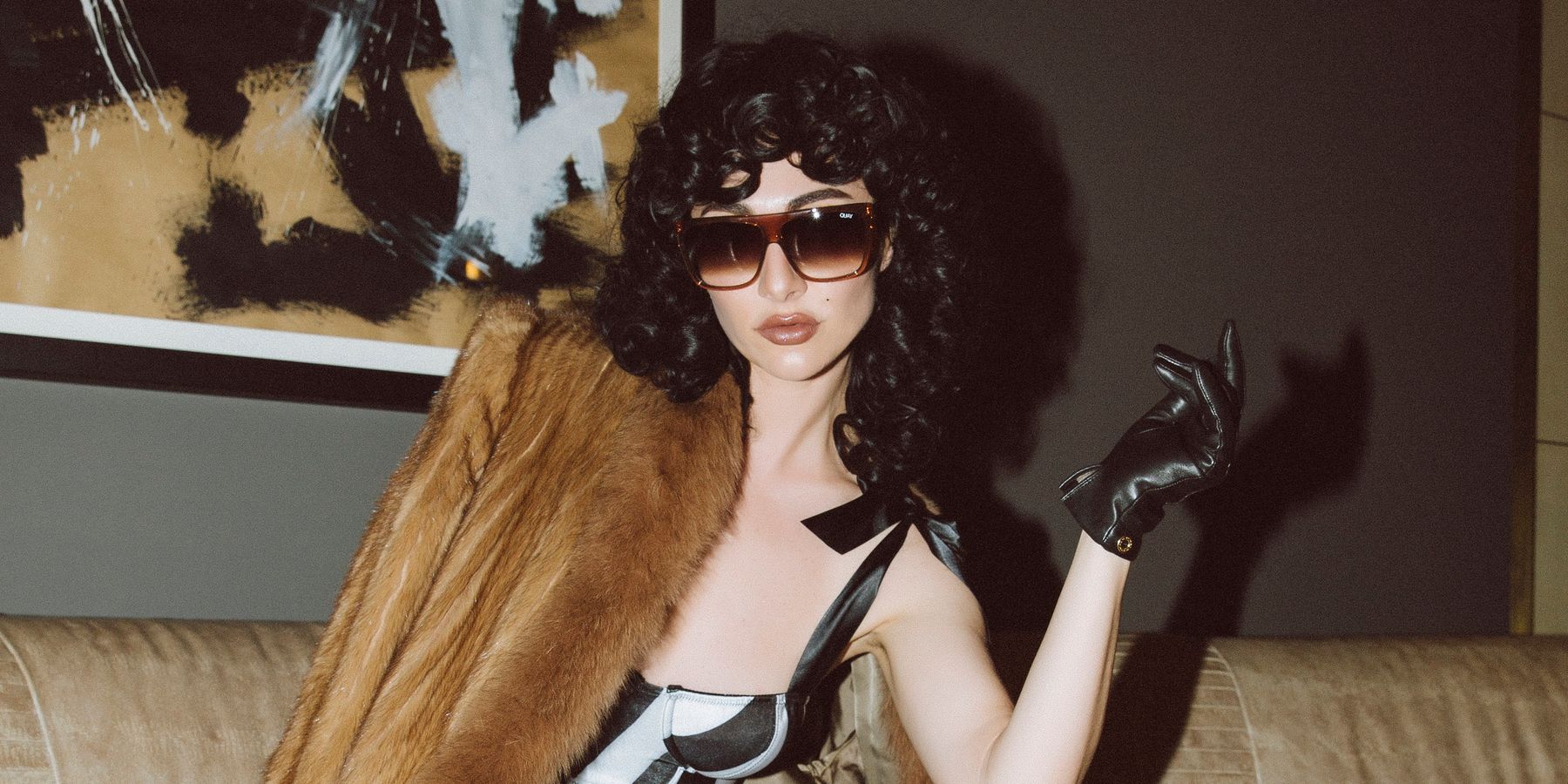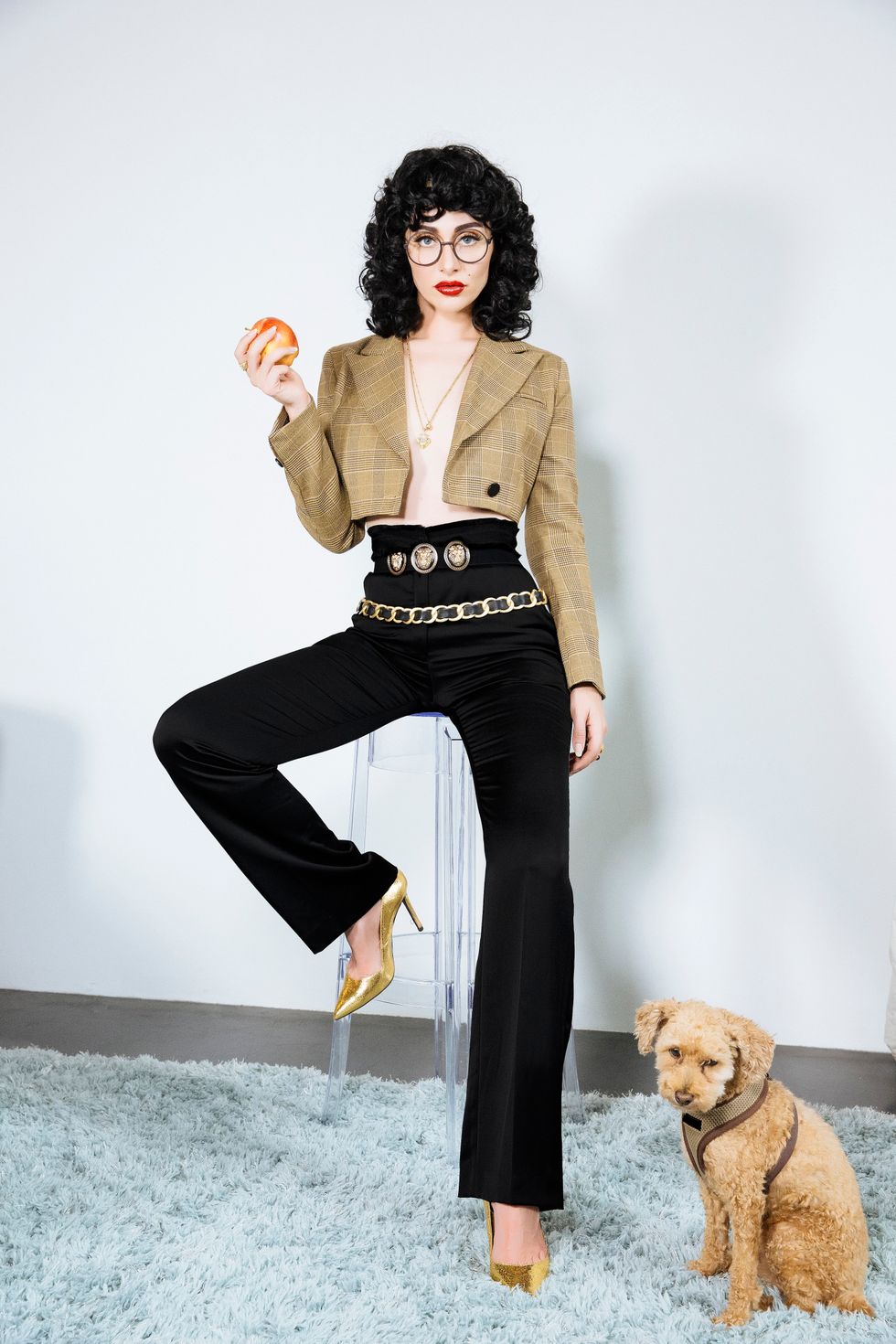
Rapper and singer Qveen Herby (AKA Amy Noonan) knows a thing or two about starting over. The music industry defined the beginning of her career, telling her what to do and who to be. From leaving her previous record label to creating her own distinct sound and thoughtfully choosing her new stage name, Herby is ready to move forward with solo music and share her authentic self with fans — but not without acknowledging her roots.
As a child, Herby was inspired by the R&B-infused melodies of Missy Elliott, Lauryn Hill, Brandy, TLC and more that she emulates in her music today. In 2011, she found herself in a whirlwind career change. Before she knew it, a video of her singing and rapping had been viewed millions of times and she became signed to Epic Records with partner Nick Noonan as the duo, Karmin, (remember "Brokenhearted?") She was rising on the charts, but not with the music she truly wanted to make.
Today, Herby has amassed thousands of streams and views all on her own, and shares a new track, "Check." "Everybody know that I'm a queen," she raps, something that is now indisputable. Herby is prepared to tell her own story, pay homage to her identity as a female rapper, and to honor those who came before her, especially Black women, who faced obstacles in the music industry that Herby's privilege protected her from.
In Herby's own words, below, this is how she developed herself into the artist she always wanted to become:
Welcome to my hometown, the isolated cornfields of Seward, Nebraska, population 6,964. There's me, scribbling bad rhymes in a furry purple notebook on the hot driveway to the rhythm of cicadas and ripping out pages from "naughty" teen magazines. Growing up in this quiet church community, I knew nothing about city sirens or freestyling on the corner, but when my 6th grade boyfriend gave me a bootleg CD of Dr. Dre's Chronic 2001 it was like a tractor beam had sucked me right in. The heavy bass, fat drums, devious strings, soulful hooks and heavy flows had me Little Mermaid-longing for the world "out there," but since flagrant sexuality, cursing and drug references were forbidden in my house, I had to dig furiously in the racks at Walmart for CDs sans parental advisory sticker. Brandy, Missy, SWV, TLC, and Lauryn became my teachers.
My parents saw my passion and lugged me to perform at shopping mall talent shows. Noticing the pile up of cheap plastic awards, they began searching for a music program that would give me some kind of credentials and hopefully lead to some kind of a job. Despite their worries about the big city, my parents put me on a plane to Boston's Berklee College of Music and I will always be grateful for that.
Music school was my first taste of freedom and independence. I was lucky to come of age in a diverse city with musicians from all over the world. My Dairy Queen savings from home didn't last long, so I happily started juggling three jobs to pay my rent and tuition: singing at weddings, traipsing around a retail store and spending days wired to a headset in a cubicle. I also met the love of my life and together we started a band called Karmin. We spent a lot of time busking on Newbury Street and in 2011, posted a version of Chris Brown's "Look At Me Now" to YouTube. Much to our surprise, our speed-rap cover became an overnight phenomenon and has now been viewed almost 110 million times.
Karmin began getting offers from some of the biggest labels in the world, but I had only just started to figure out how to rap, let alone how to contribute to a culture I didn't belong to. The secrets of the music industry came flooding into my experience all at once. As soon as the ink dried on our record deal, there was an influx of strangers telling us what to do. Experts in every field showing us the ropes, contradicting each other and arguing over what color my hair should be. In my first recording session, I was given a song to sing and directed on how to sing it. The track was immediately mastered and sent to radio stations, followed by a $200,000 music video shoot. There were no conversations about artistry, only conversations that led to the cancellation of our wedding because, we were told, being married wasn't "marketable."

At the same time, I was trying to please my parents and protect them from this crazy new world I was living in. Keeping the lyrics PG-rated saved me for some time, but I'll never forget the brief phone call with my mom after our Saturday Night Live performance where she noted how inappropriate my outfit was. This people-pleasing Nebraska girl stood no chance!
They say your soul chooses how to incarnate, into what body and circumstances it needs, in order to heal its broken parts. But nobody can tell you how to listen to your soul — that's on you. That's what living consciously is about. A couple Eckhart Tolle books and an astrology reading triggered a confusing, epic transformation that was uncomfortable and took time. I began to meditate and learn self-care rituals. I began writing in a journal and focusing my intention. The vibration of my energy field changed so much that things in my life that didn't serve me began to fall away without effort. Like a magnet, things I've always wanted but felt undeserving of began flowing into my experience.
This reinvention, summoning of courage to question everything, has become the driving force behind my current artistry as Qveen Herby. By adopting a name like Qveen, I was able to confront my "disease to please" and finally put myself first. I took Herby from Herbie Husker, the beloved mascot for the Nebraska Cornhuskers, so I don't ever forget where I come from.
My parents don't listen to Qveen Herby, but they still love me. I'm now seven independently released EPs deep, running my own Checkbook Records out of a 1930's loft in DTLA with a ferocious team of fellow creatives. Together we write and produce all of Qveen Herby's music, videos, merch and tour production, as well as a boutique cosmetics line. There are mood boards, lots of weird antiques, and a baroque-framed portrait of Kanye hanging in the studio right next to video production.
Becoming Qveen Herby, I've learned that art and free expression is pinnacle for my lyrics, persona and visuals. I've also continued to navigate the topic of appropriation as a white girl making hip-hop music. Asking why so many white female artists are problematic in this regard, and why so few get it right. What I've found is that nobody really wants to talk about it. When I fell in love with hip-hop culture all those years ago, I saw musical gods. What I didn't see was the systemic oppression of Black and Brown people, and the white people who don't believe it's real. With my growing platform, it's my responsibility to respect, honor and appreciate the culture that most inspires my art, and has thoroughly shaped virtually all contemporary music, while acknowledging my white privilege. It was my generation that saw the birth and rise of hip-hop, and I consider it my mission to contribute to the music and culture in a meaningful way.
Qveen Herby is finally what I signed up for and I love it. I want to be a female voice in a male-dominated genre and lift up more female rappers. I want to be your hype woman. I want to show the courage it takes to free yourself and live your best life, to accept that it's okay to change if you've gotten off track. To commit to your soul's journey and let the transformation happen. To be loving to everyone you come in contact with. I want to show you how I built my Qveendom and inspire you to build your own. — Qveen Herby
Photography: Gretchen Lanham